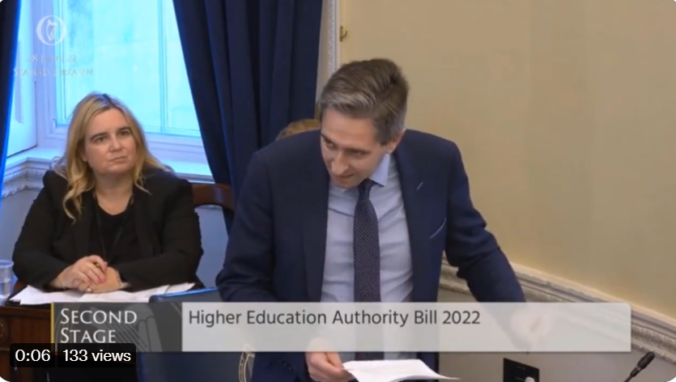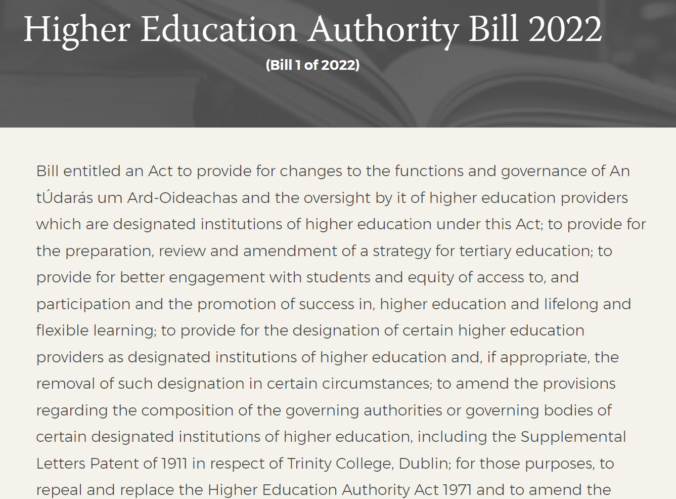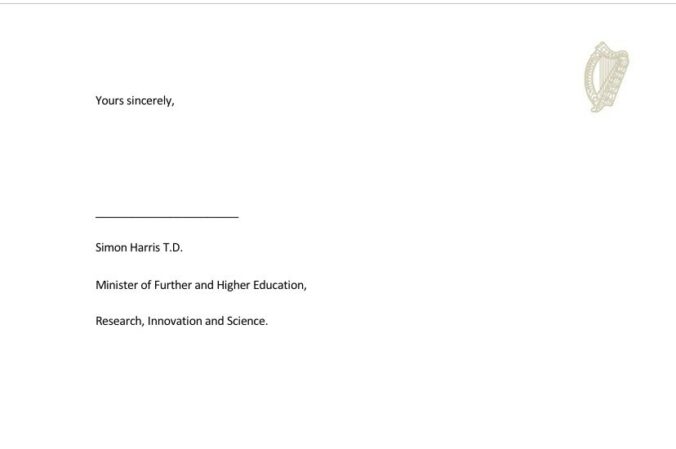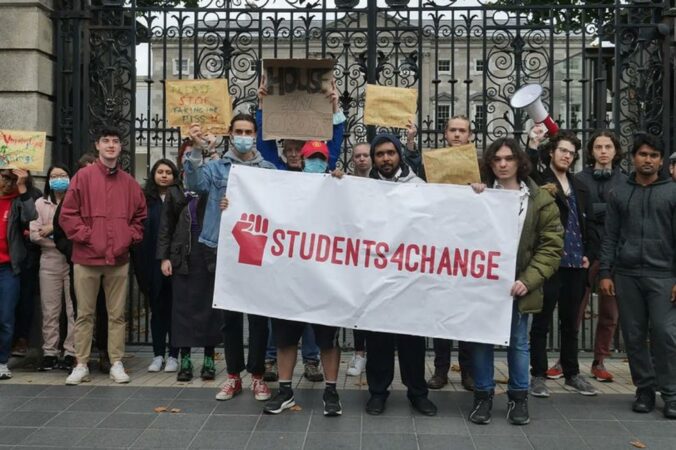In response to Senators' opposition, @SimonHarrisTD says that @tcddublin itself agreed to having more external members on Board. In fact, that working group was undemocratic, dominated by Provost's apparatchiks and its output was very harshly critizied. #StopHEABill22 pic.twitter.com/U7M8B9Osp5
— Students4Change (@S4C_group) June 29, 2022
Leftist students for social progress.
Month: June 2022 (Page 1 of 2)
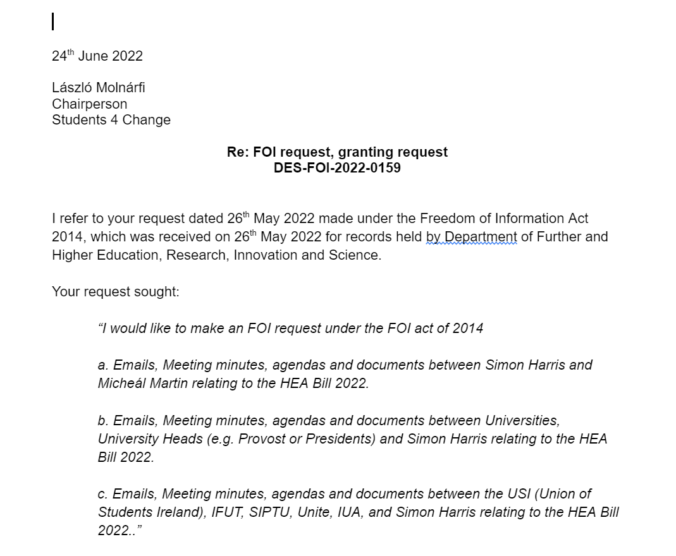
FOI Reveals IUA called HEA Bill 2022 “unworkable”, multiple universities dissent at “command and control” structure
In response to an FOI request submitted by Students4Change alongside the Trinity Graduate Students’ Union 23 documents were provided. These are engagements of University Leaders, USI, IUA and others in relation to the HEA Bill 2022. Virtually the whole sector is discontent with this bill. The HEA Bill 2022 was discussed in the Daíl last week on the 22nd of June 2022, where Deputy Rose-Conway Walsh proposed an amendment to include trade union representation on the HEA Board but this was rejected by Minister Harris. The bill will be discussed in the Seanad tomorrow (28/06/2022).
The documents include UCC and Maynooth calling the bill a “command and control” over universities, the IUA saying that aspects of the bill relating to how funding can be widthrawn and conditions set anytime by the CEO of the HEA do not “accord with natural justice and will prove unworkable”, and universities raising concerns that state control will lead to reduced EU funding. Interestingly, the Provost of Trinity College Dublin Linda Doyle is seen to not be as oppositional to the bill, and in one instance, talks about a possibility to “impose change on the Fellows through the statutes” and about how Trinity have convinced the community that smaller, competency-based Boards are needed. Minister Harris insists that the HEA Bill 2022 is a “comply or explain” system in section 136, which allows the HEA to issue codes, policies and guidelines to institutions.
The HEA Bill 2022 has been critizied for the shrinking of governing bodies to favour corporate, state and university leaders, for the composition of the appeals Board that is picked by the Minister, the sway of the Minister and their cabinet over the equality policy and other aspects. Trade union, staff and student representation will be reducted in favour of those not keen to upset the apple cart.
Please find the documents in our S4C FOI Drive. Below you can also find quotes from S4C and GSU, and also a timeline which describes these documents.
The bill remains a disgrace. Within universities, the HEA Bill 2022 is a power grab by bureaucracy over students and staff. On a national level, the HEA Bill 2022 is a power grab by the HEA over universities.
Trade union, staff and student representation will be shrunk in favour of state, corporate and university leaders on the governing bodies of our universities. On top of this, the HEA Board will stand as an unaccountable, Minister-dominated command-and-control body over our institutions. The apparatchiks of the Minister will sit on this Board, with only 1 student representative who the Minister can reject if they so wish, and the legislation even lacks the basic safeguard of the HEA Bill 1971 where at least seven of those on this board would have to be academic representatives. The centralization of power in the hands of the state should be of extreme concern to anyone who respects democratic principles.
The HEA Bill 2022 is a move towards a U.K.-style environnment for academia. What is happening is that the government is coming in, underfunding academia, and then will impose an austerity regime with their now-expanded powers. It is the height of the corporate fever to think that the way our universities are run has to do with not enough oversight by government officials, when in fact the failure of our institutions to meet targets simply comes from the decades-long underfunding of academia by the state. This is the same underfunding that has corporatized our institutions into for-profit companies. With the government only committing to half of what the 2016 Cassels Report asked for the sector, the situation will not improve. Precarity will increase, welfare supports will continue to not be funded and the logical conclusion of underfunding is that student loans might be introduced in the future, despite government promises. The neoliberal university is the same everyhwere.
It is a joke that a Minister is asking a democratic parliament to reduce democratic representation on governing bodies. Bureaucrats wrote the bill, with their corporate reasoning of “efficiency” and “competency”, to reduce governing bodies and tip the balance towards those who are not keen to upset the apple cart. The real bliss of this bill for bureaucrats will be that no more awkward questions will be posed at governing body meetings. The bureaucracy that will be dealing with will transform our universities into businesses, and what we will see is that subjects which make no money will be stripped, and further on we go into the neoliberal spiral. There are some competencies you cannot measure.
I would refer you to President Michael D. Higgin’s speech on the 8th of June last year. The academy is now a “winter”, as Max Weber, the great 19th-century social theorist, foretold. He spoke of the threat of a “spring that would not beckon with its promise of new life”, but would deliver instead “the threat of a winter of icy cold”. Weber prophesied “an iron cage of bureaucracy within which conformity would be demanded”.
Do not let us conform. This bill is an affront to our constitution and to our values.
László Molnárfi, students4change chairperson
Firstly as President of the GSU, I wish to express my total opposition to the HEA legislation and the unconvincing College counter to it. I have made it known at the Board of Trinity College meetings that I oppose it and I also wish for it to be noted that I have lodged my formal dissent to it.
The Bill is short-sighted and reactionary. It undermines our capacity to support students in these most troubled economic times and to dilute student representation, which has a long history within Trinity of confronting the challenges that students face and will continue to face into the future is unacceptable.
We will fight this at the Graduate Students’ Union alongside the Students’ Union and insist that the four student seats which are currently on the Board remain safe. A student can never have enough representation and I will continue to fight against these cuts on my watch.
I have met with numerous advisors and public representatives to discuss the HEA Bill and the Supplemental Charter and after vast consultation, I am convinced that the legislation leaves not only Trinity College without autonomy but our country without an autonomous university system. This is a sad result for civil society and it is particularly disappointing for Trinity College (a place with talented academics who have educated me and whom I admire greatly). Both the HEA Bill and the Supplemental Charter decimates the collegiate structure of the governance of TCD by undermining the role of the academic staff including their trade union members, professional staff and their trade unions, the fellows – this not only collectively impacts the student experience negatively amongst the college population but is unacceptable and a viscous attack on student welfare and the student voice. We are therefore convinced that the College response is not in the best interest of students and we state our complete opposition to the proposed HEA legislation.
I have met with democratic representatives of our national parliament and have found genuine support for our opposition. I have discussed the idea of democracy and its deliberate reduction through the proposed HEA Bill legislation and the distinct lack of opposition by College to the Minister. The Union agrees with some Fellows who are also of the opinion that this hurried decision to support the Minister in facilitating the reduction of representation at the Board by Trinity College is in direct conflict with our pre-independence charter which is binding on both parties in perpetuity. This is indicated in the US Supreme Court in the Dartmouth College case in 1819. The “surrender” charter of 2022 paves the way for the HEA Act and should also be rejected. The push comes from officers who have failed since at least 2018 to defend our historic charters which are binding in perpetuity. None of the items in either piece of legislation has been properly evaluated.
The attack on students in the HEA bill is defended by the Minister and has to be challenged. Apart from a small group involved with the Minister, I have not met anyone who supports reducing student representation. Students are the majority population in College. The Officers and the Minister promoting the legislation have a dim view of us. Those in our community who provide teaching labour as part of a research agreement are talented, able, and valued members of the governance (through representation) and education system. We have been utterly betrayed.
In consultation with representatives and various College fellows we have gleaned that that the Bill’s attack on Ireland’s only autonomous university and its royal charter is an action we promised at the Belfast/GFA not to do. After referendums in both jurisdictions we incorporated into Article 3 of the Constitution a commitment to respect the diversity of the traditions and identities on the island of Ireland. We take this o good stead to be the case. Trinity College Dublin has always been an all-island body serving both traditions and identities with a distinct legal identity. I doubt if the proposals of the Minister and the College would have made it through the east-west or north-south provisions of Belfast GFA or meet the legal standards of our partners to the Belfast GFA, namely the United Kingdom and the United States. We have discussed this at length and have taken advise form Sean Barrett amongst many others.
I have been asked to put forward my opinion, I believe that this is harmful legislation which will affect the Irish higher education landscape, Ireland’s reputation as a liberal tolerant modern democracy and, in particular, the reputation of Trinity College and our student experience and the value of our degrees as a result. I have already communicated my deep concern at numerous meetings and shall continue to do so: in a time of rising inflation, rising student fees (which we oppose as unacceptable) and a rising cost of living for our student population, losing any voice from College Board is unacceptable and we will continue to challenge this to the end.
Gisèle scanlon, president OF TRINITY GRADUATE STUDENTS’ union
Here is a timeline below which we have reconstructed with the documents provided from Minister Harris’ office.
5th of March 2021 (#1) – UCD writes to Minister Harris to fix the imbalance between funding opportunities for fundamental and applied research.
5th of March 2021 (#2) – IADT writes in a submission to Minister Harris that the HEA Bill is not pandemic-proof, and does not include learned experience from Covid-19. They furthermore say that there is no macro-view, no defined roadmap or vision to the bill. It is a bill lacking a national vision, which, if the bill were to be delayed, could be worked on with a proper consultation. The submission further states that the consultation process seems to have excluded direct feedback from key stakeholders. They furthermore mention that accountability and autonomy should be managed on an institutional basis and not on a sectoral basis, and criticises the use of penalties as a primary enforcement mechanism.
5th of March 2021 (#3) – Trinity Fellows write to Minister Harris say that the proposals in the bill would dismantle the democratic, diversity and competency of the bodies of College, most specifically Board. They argue against an external majority. The need to respect Trinity’s autonomy, a well-performing institution, must be protected, they say.
15th of April 2021 (#4) – Representatives of Trinity College Dublin met with the DHFERIS, where both parties expressed a wish to reach an agreement. DFHERIS said that they have been “intentionally silent” on Trinity in order to give them space to discuss issues specific to the College. Trinity said at this meeting that “TCD wish to arrive at a situation where the changes in TCD are framed in a private Act which is approved by the Fellows and linked to the legislation. The alternative is to impose change on the Fellows through the statutes” and “They have persuaded the TCD community that a smaller, competency based board is needed in Trinity”, despite this not being the case according to a University Times article from 2020 in relation to a similar proposal.
1st of December 2021 (#5) – USI raises the issue of student union autonomy as part of the HEA legislation in a meeting with Minister Harris.
16th of December 2021 (#6) – Minister Harris follows-up on earlier meeting with Trinity and agrees to an exemption.
12th of January 2022 (#7) – Provost replies to Minister Harris saying that after discussions with Board and Fellows, “while some opposition and reservations were expressed with aspects of the proposals”, there is a “sense that the proposals relating to Trinity may be generally acceptable on a consensus basis”, provided that the change is made via private legislation, and that this right is retained by Trinity.
18th of January 2022 (#8) – Minister Harris follows-up on USI’s queries regarding student union autonomy, asking them to forward any views, including “how student unions are currently established and governed and their relationship with USI and any interaction that USI has had to date with representative bodies such as IUA and THEA on how such matters might be advanced collaboratively”. He also promised a follow-up meeting. Furthermore, the Minister lays out in this email other student partnerships, such as QQI, StudentSurvey.ie and also Section 136 (to issue guidelines, codes and policies to universities) to help autonomy. Furthermore, he refuses to change the composition of governing bodies.
10th February 2022 (#9) – IUA requests a meeting with the Minister saying that certain aspects of the bill “such as those relating to the unilateral powers of the HEA CEO and the appeals process for actions or measures taken by the HEA require specific attention as we, we believe, they do not accord with natural justice and will prove unworkable” and they attach a list of amendments.
21st of February 2022 (#11) – IUA follows up on meeting request.
7th of March 2022 (#12) – UCC writes to Minister Harris to express “serious concerns” about the bill, and that “We are concerned that the draft legislation, if enacted, may interfere with the responsibility of the University to take the necessary decisions in teaching, learning and research. This is both an issue of academic freedom and of the autonomy of decision making which enables UCC to carry out its particular mission”. UCC says that the powers of the CEO of the HEA are not accountable, and that the compliance with guidelines, codes and policies will result in a ”command and control” system over universities. They also mention that the right of appeal is limited, and not independent. Furthermore, they mention that the HEA Bill 2022 under EU rules might reduce the overall capacity of the state to borrow, if Eurostat assess the proposed restrictions amounts to government control.
8th March 2021 (#23) – NCI requests to be included as HEI under the legislation.
9th March 2022 (#13) – IUA confirms a meeting with Minister Harris for the 14th of March.
25th of March 2022 (#14) – IUA follows-up and says that there are a number of issues that have not been addressed, such as the CEO’s power to apply any funding conditions, the lack of checks and balances before applying remedial measures, the independence of the appeals Board and others.
16th of May 2022 (#15) – UCC follows-up and stresses once again to Minister Harris’ that there is the threat of a “command and control” system over universities which mean that the doctrines of the HEA will become legally enforceable without being enacted in the form of legislation, and also stresses the issue of a need for a broader right of appeal.
16th of May 2022 (#16) – IUA sends Minister Harris UCC’s correspondence.
17th of May 2022 (#17) – Maynooth University sends Minister Harris email, saying that the HEA Bill will “erode the autonomy of institutions”, and that accountability and autonomy is insufficiently balanced. They also say that the current approach is a “command and control” system.
9th of June 2022 (#18) – Minister Harris replies to IUA and says that he believes that the bill has struck the correct balance between autonomy of HEIs and oversight. He rejects the IUA’s amendments in relation to “comply or explain” as opposed to “command and control”, saying that legal advice has been sought and it would not be appropriate to make the changes as requested. He also rejects an amendment by the IUA with regards to Board approval in respect of certain decisions, and approves a few and rejects a few others. Out of 7 proposed IUA amendments, he rejects 3 outright, rejects 1 because previous amendments were made, accepts 2, and adds 1 alternative amendment.
13th of June 2022 (#19) – Minister Harris replies to Maynooth University where he informs them that he is not making any further amendments to the “comply or explain principle”, saying that there are appropriate safeguards in place.
13th of June 2022 (#20) – UCD meeting with Minister Harris.
17th of June 2022 (#21) – Trinity Provost sends Minister Harris supplemental charter as agreed at Board on the 15th of June. There were 2 dissents at that Board meeting. Provost asks Minister Harris to check if there is anything that will conflict with the bill in this, to verify.
22nd of June 2022 (#22) – Minister Harris writes to USI that after legal advice, he is not in a position to agree to amendments relating to students’ union autonomy. He says student engagement is already guaranteed in the bill, and that section 136 (to issue guidelines, codes and policies) will be used to guarantee student union autonomy.
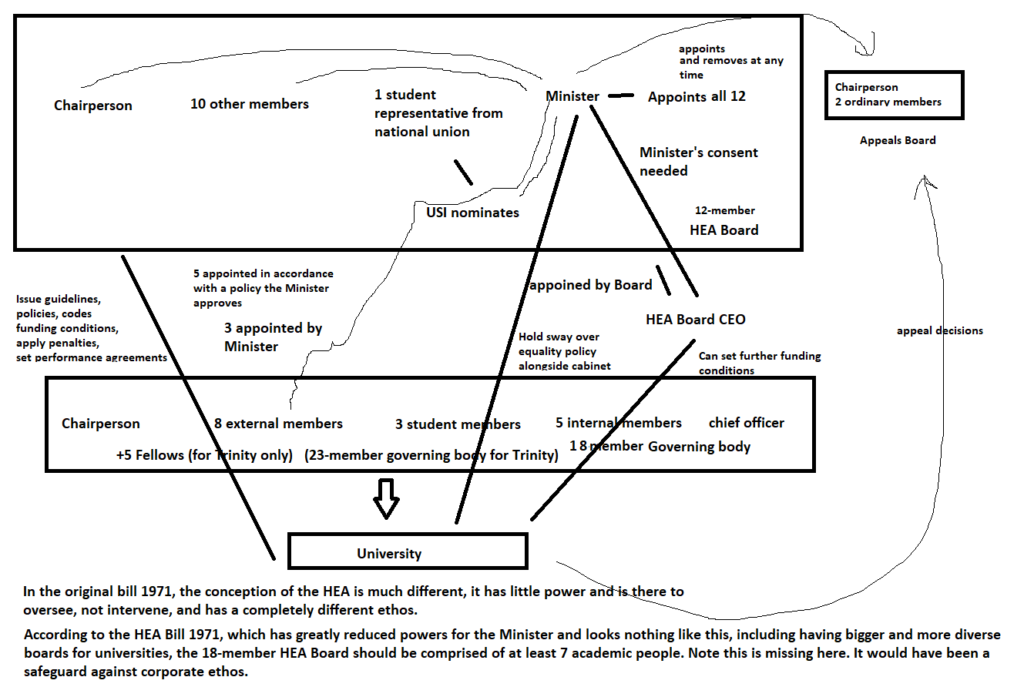
In the latest as amended bill, the HEA Board CEO can only set additional conditions with the consent of the Board.
- The Minister will be able to appoint the 12-member HEA Board, including approve or reject the national student union’s representative (16) (a). This board fulfills the aims of the HEA, including its committment to equality, inclusivity and diversity (section 8 and 9).
- The Minister will handpick 3 people on governing bodies of universities, and a further 6 will be selected by the governing body in accordance with a policy set by the governing body that he “approves” (73) (4).
- The Minister and his Board can set the funding conditions for universities, including “use the funding in a cost effective and beneficial manner”, “operate according to standards of good governance,” and comply with the “guidelines, codes and policies” that they issue (Chapter 2, (37) and (38)) under section 143. If an instiution fails to abide, the conditions of funding may be revised, funding may be withheld, or the institution may be told to repay funding. Section 38 (b) also allows the CEO – appointed by Board with Minister’s consent ((25) (2)) – of the HEA to set any other conditions for funding, with the Board’s consent.
- The Minister can ask the HEA to prepare “guidelines, codes and policies” for “the implementation of any policy or objective of the Minister or the Government” that will be applied to HEIs under section 143.
- The Minister appoints the appeals board for the decision to witdhraw funding, as per (69), so it is not an independent body.
- The Minister and his Board can use Section 143 which gives power to issue “guidelines, codes and policies” to HEIs, on which the HEI must report progress to the HEA on.
- The Minister and his Board can use Section 35 and 36, to dictate the development and focus of universities with “performance agreements”.
- The Minister (and his cabinet if the Minister so wishes) will hold sway over universities’ equality policies due to needing to be consulted about equality statements (62) (4).
- S. 107, s. 108, s. 118, s. 9 (s) combined with the powers to set additional funding conditions as set out in (S38(2)(h)) poses concerns that the Minister will now be able to control land acquisition and disposal of universities.
Within universities, the HEA Bill 2022 is a power grab by bureaucracy over students and staff.
Within the national scene, the HEA Bill 2022 is a power grab by the HEA over universities.
Sign the petition!
#StopHEABill22
This morning, Minister Harris confirmed that in the HEA Bill 2022, student representation will be increased from 2 to 3. while not the 2-4 that was ideally proposed, the student voice on governing bodies will be stronger than initially proposed. This is a win.
This is the collective work of the TCDSU, S4C, TCDGSU, the USI and other student groups.
As you can see from our posts, There is more to campaign on, and we hope this opens the way for other similar amendments to be made for staff and trade unions. The fight is far from over and the student movement will not rest until our universities are diversified, democratized, decolonized and demarketized!
Take action!
#StopHEABill22


Myth: The HEA Bill 2022 will mean that the government will invest in mental health and other areas.
Truth: The bill itself does not contain any provisions for mental health funding. The “Student Mental Health and Suicide Prevention Framework”, already published in 2020 October will fit in to provide for it under section 37 of the legislation. However, in line with government policy of consistently targeting mental health funding during austerity and in 2012, 2016, and a general continued sharp decline in the health budget from 16% in the 80s to 6% in 2020, we do not think the government will do anything differently and step up under the new bill. There is a stated need of 28 million euros for an appropriate student-counsellor ratio (USI – Pre-Budget Submission 2022), in response to which the government provided only 5 million euros.

Myth: The HEA Bill 2022 and the funding plan for universities are separate issues.
Truth: You can’t have one without the other. The HEA Bill 2022 contains the framework that will distribute funding. In the funding plan, there is no commitment to reducing the student fees as the USI pointed out and also, the funding is less than half of what our universities need as per the 2016 Cassels Plan.

Myth: The HEA Bill 2022 will increase student representation on governing bodies.
Truth:
In earlier drafts of the bill, over 60% of HEIs will lose student representation on governing bodies, as the bill prescribes 2 representatives, including Trinity, UCD, UCC and others.
However, on the 21st of June Tuesday 2022, it has been confirmed that Minister Harris will support an amendment that increases the number to 3, changing the situation. It is not ideal, as we would have asked for 2-4, but this way less HEIs wil lose student representation. This is a win and we welcome this amendment to the bill.


Myth: The HEA Bill 2022 will mean that the USI will sit on the HEA Board, therefore democratizing education.
Truth:
The USI has been promised that they will now sit on the HEA Board, but it is just one vote against a lot of apparatchiks provided for by the Minister who will always vote against student interests. When have they ever listened to the USI in committees?
As per section (16) (2) (b), one of the members appointed to the HEA Board will be from a nomination of a student from the national student union. However, they can be rejected. The 12-member HEA Board will be appointed by the Minister as per section (16) (a), and so it is his Board, and he will control its direction and fulfil the aims set out in section 8 and 9 (e.g. equality, diversion and inclusivity). The spirit of these aims will be controlled by the government and will not be fulfiled.
Equally for all other matters as outlined here where the HEA’s scope of power is extended, the Minister is influential as he appoints the members of the HEA Board. The HEA Board is by no means democratic, and does not guarantee democratic representation for trade unions, students and staff.
For a lot of matters, therefore, we will be reliant on the Minister. For example, in an email to the USI President, Minister Harris has said that the HEA Board can invoke section 143 to protect student union autonomy. In practice, this means it is at the whim of the Minister.

Myth: The HEA Bill 2022 contains elements of student partnership.
Truth:
Once again, the “partnership” this bill promotes is the corporate one, also known as “commodified dissent” for example through the NsTEP program or StudentSurvey.ie. In the U.K. the NUS is boycotting the StudentSurvey.ie equivalent, the National Student Survey, due to concerns that it leads to the corporatization of universities. They can make as many surveys but these will not stop the rising cost of education as they relate to wider socioeconomic factors.
These surveys fit well within the KPI-centric, corporate and capitalist ways of measuring universities’ activities, like league tables, as part of the corporatized university.



Myth: The HEA Bill 2022 will provide more oversight for universities, and for taxpayer money.
Truth:
The argument that universities need strict financial oversight to overcome their troubles comes from multiple flawed narratives.
Firstly, the underfunding of universities is a crisis that the government themselves have created, and are now stepping in as saviours to fix it.
Secondly, there will be more oversight, but it is by the government. A den of thieves, crooks and landlords. The government will be no better than the universities, since both university leaders and the government belong to same elite. In fact, oversight should be done on the frontlines and with non-bureaucratic and truly democratic university governance, not via a state takeover, something that the IUA also spoke about.
Thirdly, there will be more oversight, but it is by the government. A den of thieves, crooks and landlords. The government will be no better than the universities, since both university leaders and the government belong to same elite. In fact, oversight should be done on the frontlines and with non-bureaucratic and truly democratic university governance, not via a state takeover, something that the IUA also spoke about.
Finally, there is no independent appeals board for such decisions as per (69), as the Minister appoints it, furher cementing a government takeover.
Sign the petition!
#StopHEABill22
There is an email circulating with regards to Minister Harris’ reply to an amendment about student union autonomy to the HEA Bill 2022, which was rejected.
It was sent to the Union of Students Ireland (USI) and this is an explainer post as to why his reply is not enough to protect student unions.
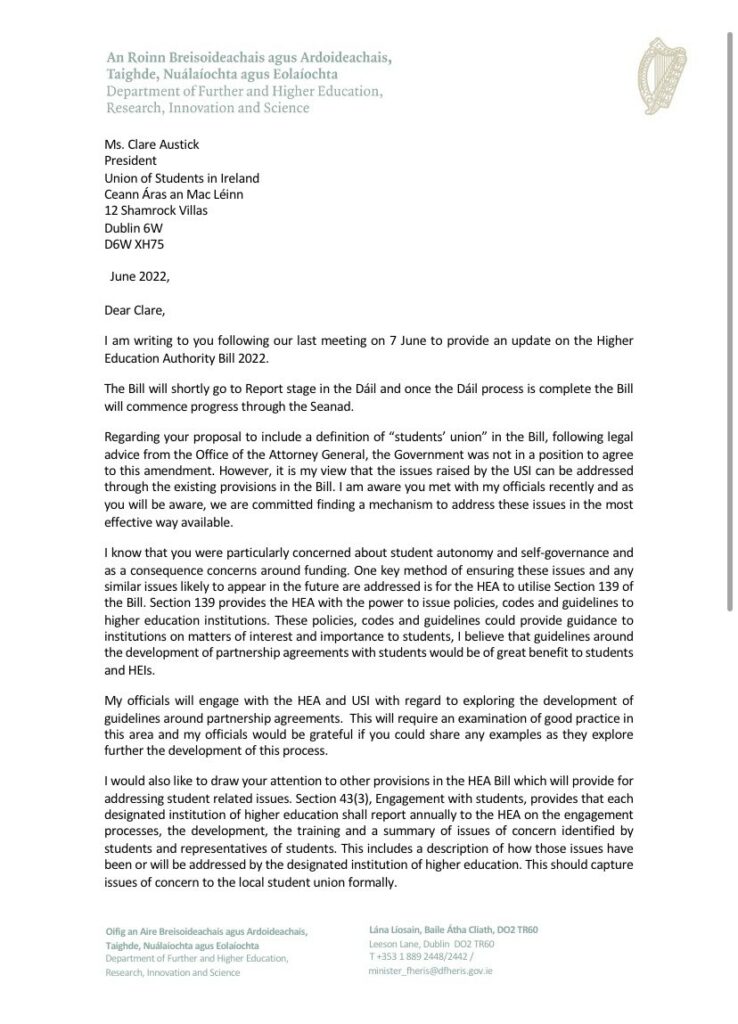
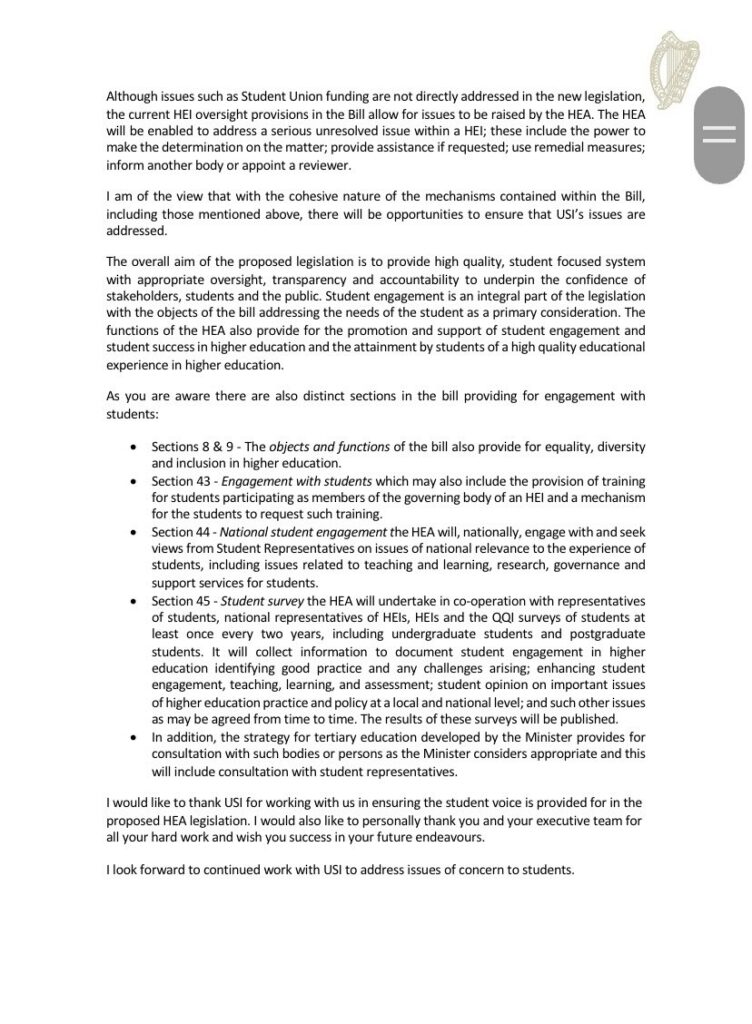
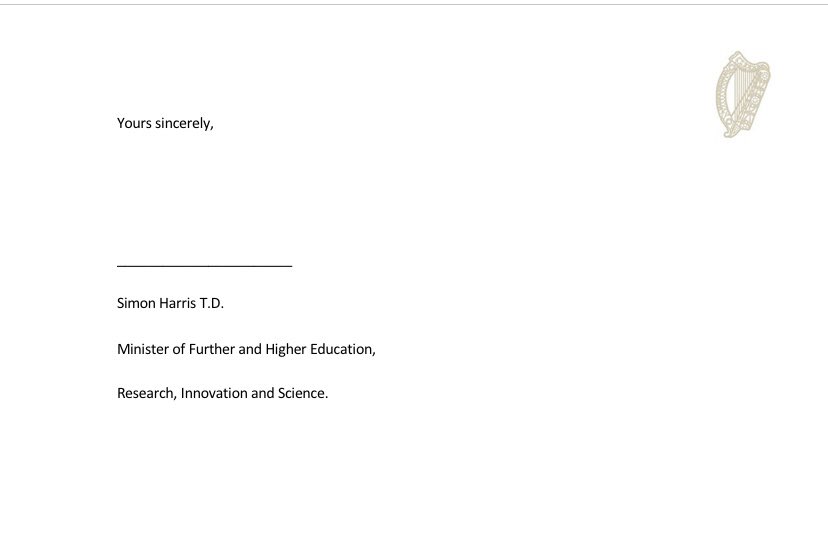
Minister Harris claims that section 139 (in the latest bill section 143) will be used to guarantee student union autonomy, in other words the HEA can use its power to issue “guidelines, codes and policies” for this.
What Minister Harris is saying in this email, is that not only will we take away universities’ autonomy with section 139, but student union autonomy will also be at the whim of the Minister-dominated HEA Board. Only one student representative will sit on the aforementioned Board, and if he does not like your student union – tough luck!
This is not in any sort of framework or legislative solution to the idea of student union autonomy, which Minister Harris later admits in the email, saying that “these issues are not directly addressed in the new legislation”.
It is furthermore unclear how student unions not affiliated with the USI, like UCDSU, will be able to raise their issues with their universities.
In 2021, NUIGSU had its funding unfairly taken from them over a dispute over a levy collected for services.
After quoting section 139, he claims that the bill has strong student partnership.
Firstly, we would fundamentally reject that any bill which cuts student representation can be considered a partnership. In earlier drafts, over 60% of HEIs would have lost students on governing bodies.
According to latest news, which we welcome, the number of student representatives will be 3, but this is still not the 2-4 we asked for.
Secondly, he mentions that section 8 and 9 provide for equality, diversity and inclusion in higher education, since they make it one of the functions of the HEA Board.
The HEA Board will be appointed by the Minister, and he promised only to have 1 student representative from the USI.
This is a joke. The HEA Board will be dominated by apparathciks of the Minister, while he weakens the student movement and refuses to reduce student fees. It does not make sense how equality will be guaranteed if the voices of those most vulnerable – students, staff and trade unions – are being silenced with the bill on governing bodies.
The implementation of section 8 and 9 under this government will result in the spirit of the law not being followed, since no further procedures or goals are outlined on how to reach this equality. Without a democratic HEA Board, and based on the prior actions of this government, there is no indication that they will implement any substantive equality, inclusivity and diversity initiatives.
Thirdly, he mentions that Section 43 will provide for the training of student representatives on the governing bodies of universities. This does not answer the question of student union autonomy, and furthermore, this sort of training fits well into the service-provider, KPI-centric and neoliberal student union, wherein everything they do has to fit into the labour market and be respectable and professional.
After setting out that Section 44 will provide powers for the HEA Board to consult with student representatives on issues of a national level, he mentions StudentSurvey.ie as an example of a partnership.
StudentSurvey.ie is a corporate survey that pushes a cookie-cutter capitalist logic, and its equivalent the National Student Survey (NSS) is boycotted in the U.K. for corporatizing universities and raising tuition fees.
QQI is also mentioned, which only cares about quality of education insofar as the bottom line, how financially viable the way institutions run their courses is.
This is disgraceful from Minister Harris.
Him and his cabinet, and all the bureaucrats working on this bill, are taking us for fools.
There are 245,000 students in Ireland, and their voting rights will be diminished with the HEA Bill 2022, as over 60% of HEIs will lose student representatives on governing bodies. A democratically elected TD is putting forward legislation into the Oireachtas that is reducing student representation. A minister is asking a democratic parliament to reduce democratic student representation. Bureaucrats wrote the bill, with their bureaucratic reasoning of “efficiency”, to reduce governing bodies. But the real bliss of this bill for bureaucrats will be that no more awkward questions will be posed at governing body meetings.
The USI needs to step up, stop being in useless committees and mobilize people. A question is, as such, posed before all our organizations. Will they become radical, or redundant?
Sign the petition!
#StopHEABill22
Our fight is against the corporatized “productive” education, constant evaluation of efficiency above equity coupled with solidarity to the the workers’ struggle and the democratic deficit of the capitalist system.
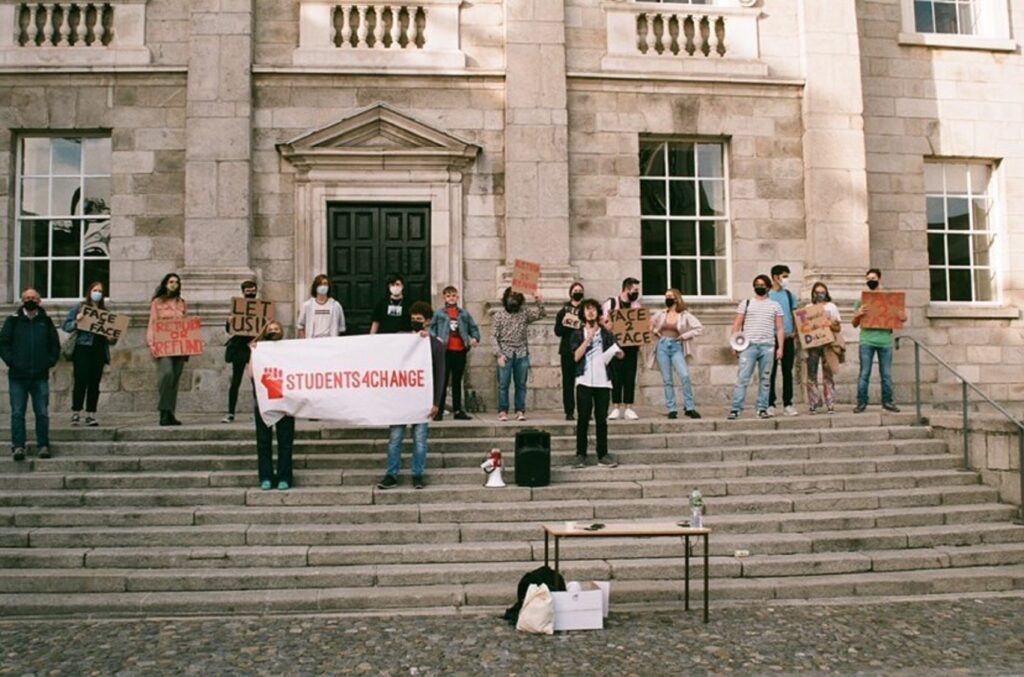

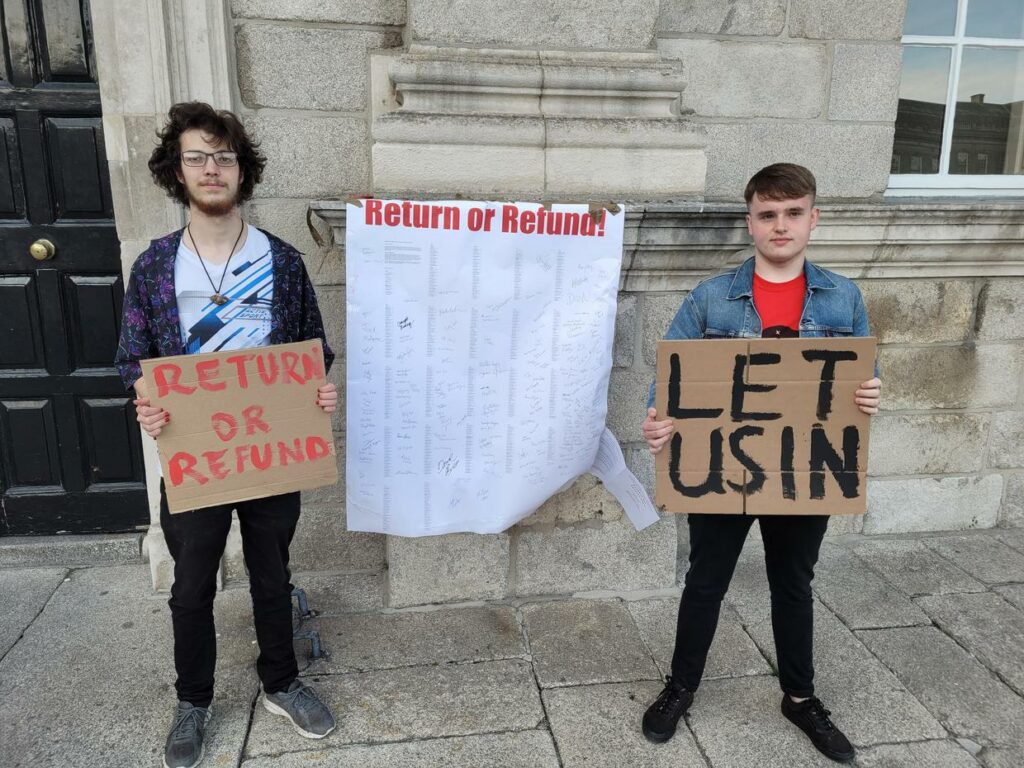
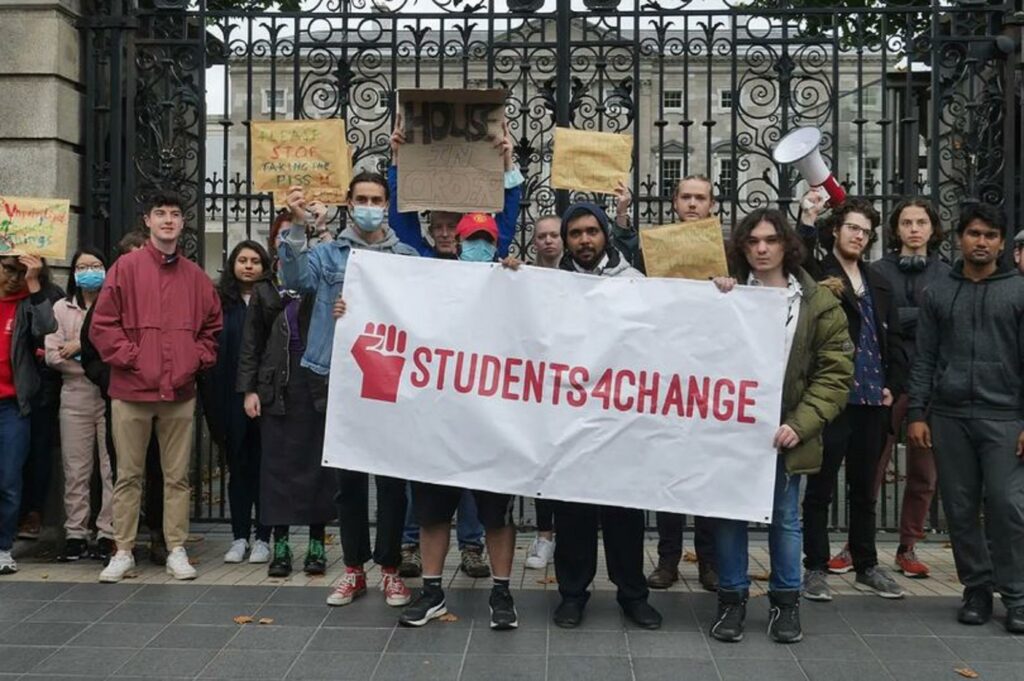
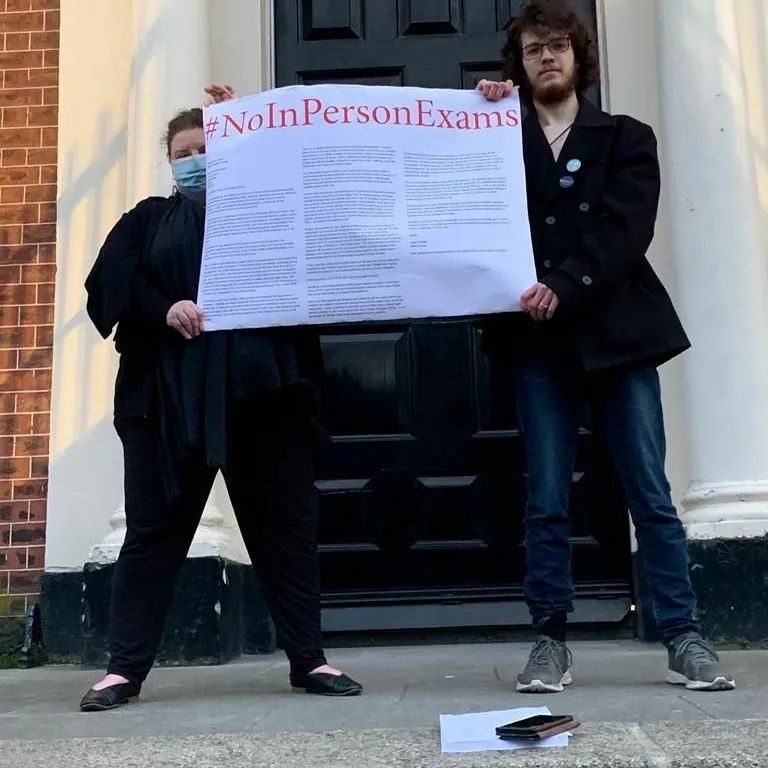

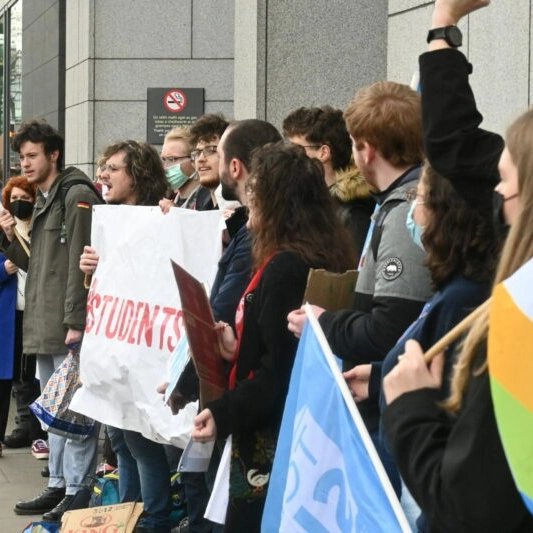


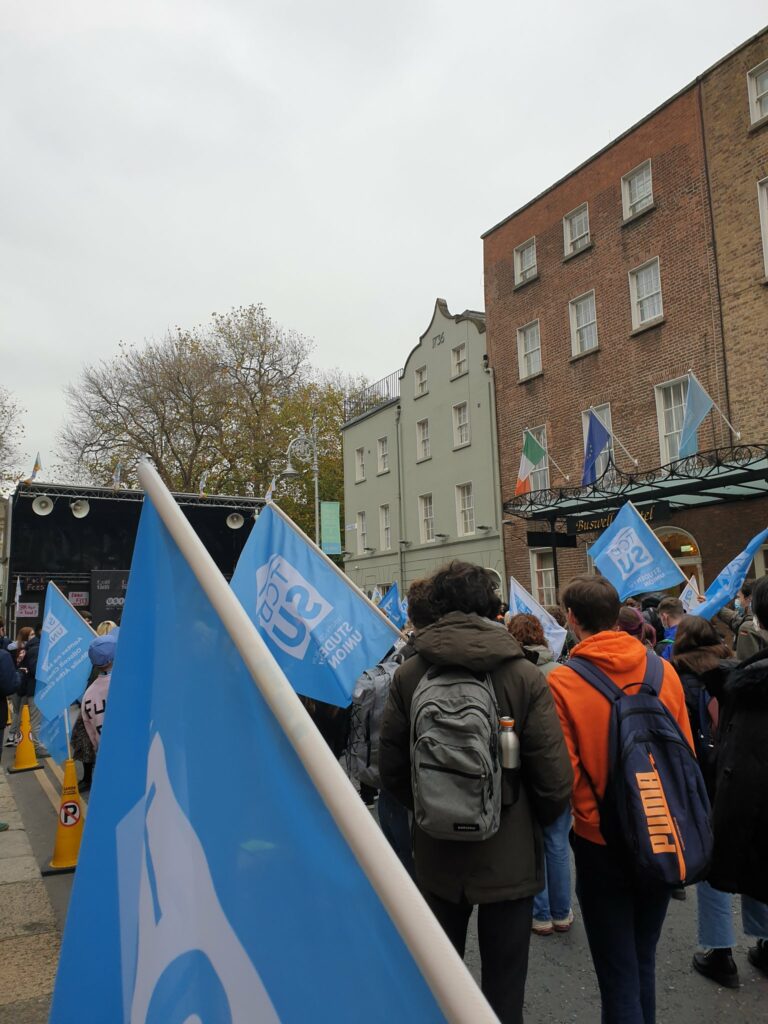


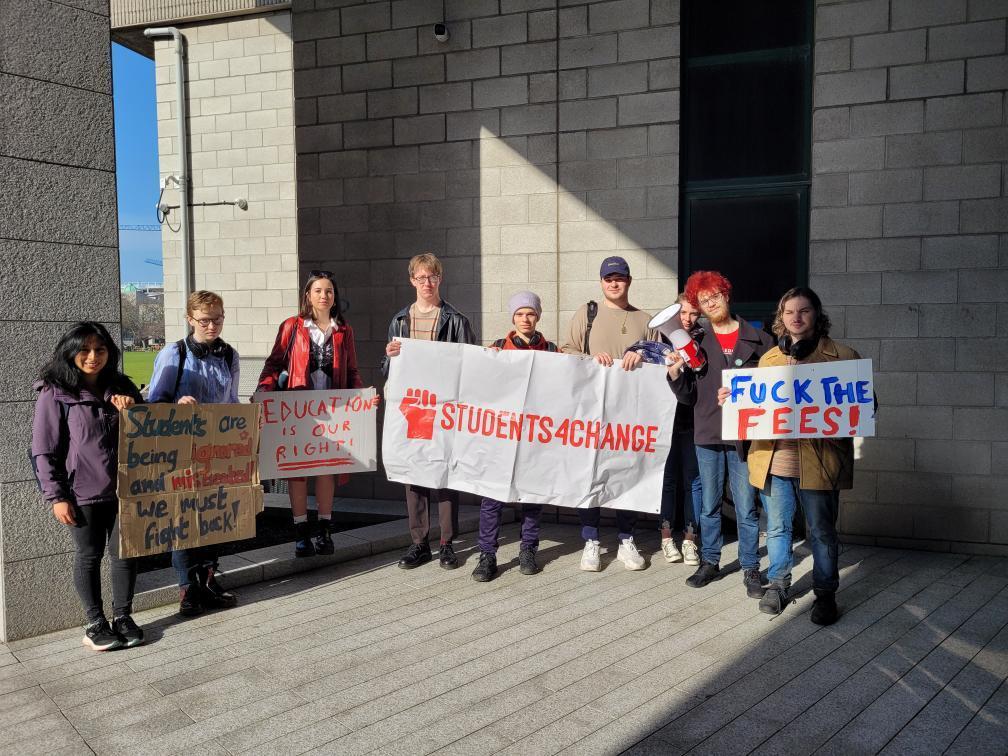

Together with Trinity GSU, TCDSU and others, we fought for the rights of student and staff. With our combined efforts, we managed to, for example, secure a better re-opening while advocating for hybrid learning, reveal investments in the war-industry, stop the structure on College Park and significantly reduce the amount of in-person exams. Onwards to next year!
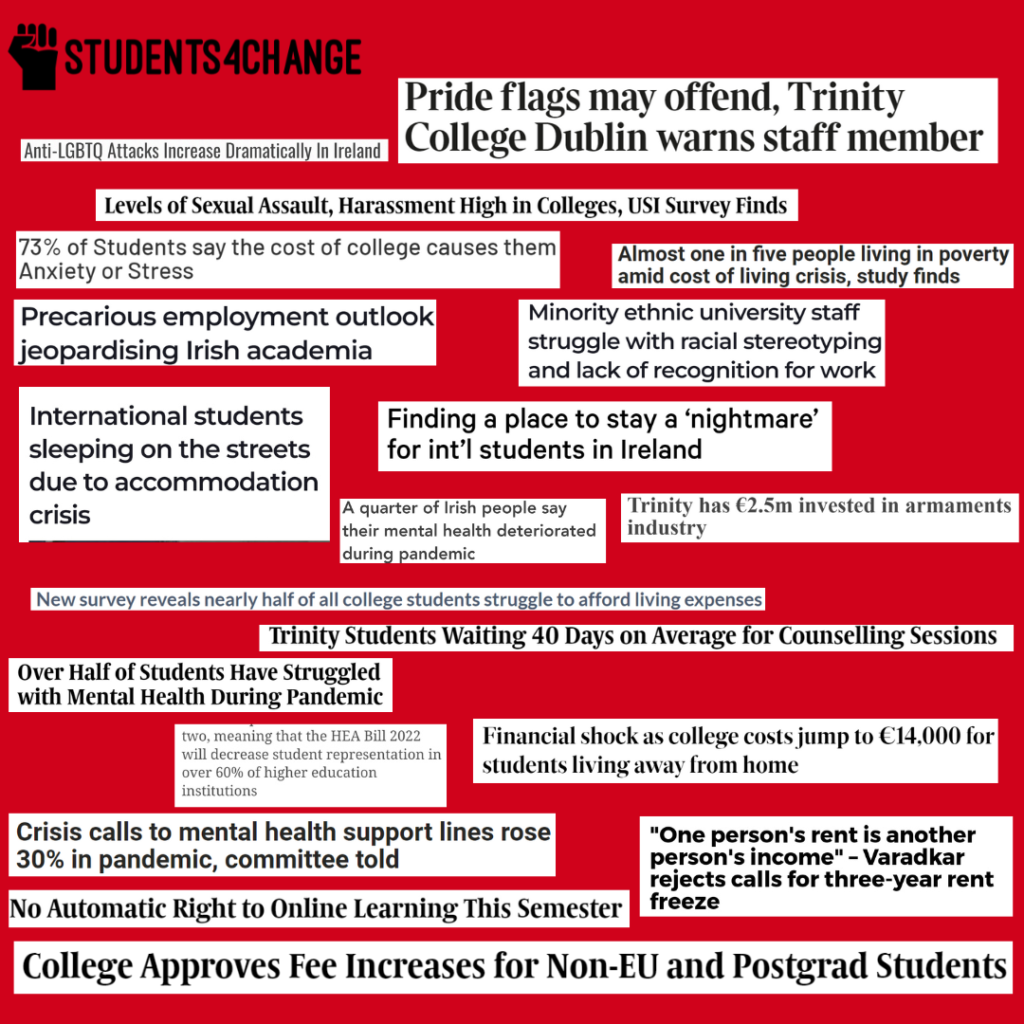
© 2025 Students4Change
Theme by Anders Noren — Up ↑
